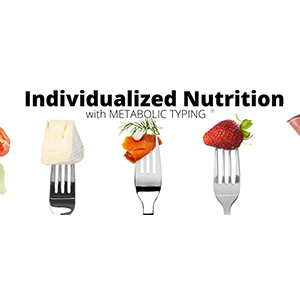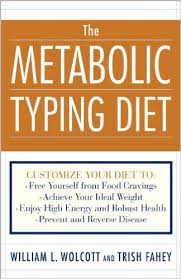Search
Highlight
- New Arrivals
- Sale
- Hot items
















METABOLIC TYPING REPORT
85.00 €
METABOLIC TYPING REPORT
Many people feel that eating a vegetarian diet is ideal for everyone, and will benefit all of mankind. This is simply not true! The saying ‘One man’s meat is another man’s poison’ is absolutely correct.
We cannot all eat the same foods – it really depends on our METABOLIC TYPE, which is based upon the research of Bill Wolcott – If you haven’t yet read the book, The Metabolic Typing Diet, I would strongly encourage you to do so as it reviews these topics extensively.
If you are already feeling good, eating should, at the very least, help to maintain your energy level. But if you feel worse in some way an hour or so after eating, such as:
You still feel hungry even though you are physically full
You develop a sweet craving
Your energy level drops
You feel hyper, nervous, angry or irritable
You feel depressed
… then it might be due to an improper combination of proteins, fats and carbohydrates at your last meal. You might be eating the perfect foods for your metabolism, but having too much of one type of food in place of another can easily produce the symptoms listed above.
Description
 METABOLIC TYPING
METABOLIC TYPING
This assessment will enable you to determine your own METABOLIC TYPING – a full report with various adjunct files will be sent directly to your email address within a few days of completing the Metabolic Typing questionnaire, which is all done online.
As soon as your payment has cleared, you will receive instructions regarding how to proceed online to assess your Metabolic Typing.
Many people feel that eating a vegetarian diet is ideal for everyone, and will benefit all of mankind. This is simply not true! The saying ‘One man’s meat is another man’s poison’ is absolutely correct.
We cannot all eat the same foods – it really depends on our METABOLIC TYPE, which is based upon the research of Bill Wolcott – If you haven’t yet read the book, The Metabolic Typing Diet, I would strongly encourage you to do so as it reviews these topics extensively.
If you are already feeling good, eating should, at the very least, help to maintain your energy level. But if you feel worse in some way an hour or so after eating, such as:
You still feel hungry even though you are physically full
You develop a sweet craving
Your energy level drops
You feel hyper, nervous, angry or irritable
You feel depressed
… then it might be due to an improper combination of proteins, fats and carbohydrates at your last meal. You might be eating the perfect foods for your metabolism, but having too much of one type of food in place of another can easily produce the symptoms listed above.
Everyone Has Their Own Unique Metabolic Type
Many people come to my office eating very high-quality nutritious foods and are still quite sick. They haven’t touched sugar or junk food in ages and still suffer with many health problems. There are a number of reasons for this, but one of the major physical ones is related to the fact that they are not eating appropriate foods for their metabolic type.

Simple Fuel Analogy
Just as food is fuel for our bodies, petrol is food for our cars. Imagine for a moment that you have pulled into an exclusive petrol station that has secured the highest quality fuel from one of the world’s leading refineries … fuel that has been screened carefully and shown to be free of anything that would possibly harm your car’s engine.
It would seem reasonable to believe that your car is going to thrive on that high-quality fuel once you put it in your tank. But what if you were driving a diesel-powered vehicle? If that were the case, in a few minutes your car would stop running, and you would have a very expensive repair job ahead of you.
The fact that the car stopped running does not imply that the gas wasn’t any good or that your car was defective. It was simply the wrong type of fuel for your car.
Like your car, your body was designed for certain correct types of fuel … that is, a certain correct blend of the right food types. The further you deviate from this ideal, the more health problems are likely. That is why some of the sickest people I see in my practice are those who are “designed” to be eating high-proteins foods but have decided to be vegetarians. Conversely, carb types who choose to eat high amounts of meats also don’t do very well.
Different Metabolic Types
There are three types of Metabolic Types:
1. PROTEIN TYPE
2. CARBOHYDRATE TYPE
3. MIXED TYPE
Protein types do better on low-carbohydrate, high-protein and high-fat diets. A typical ratio might be 40 percent protein and 30 percent each of fats and carbohydrates, but the amounts could easily shift to 50 percent fats and as little as 10 percent carbohydrates depending on individual genetic requirements.

Carb types normally feel best when the majority of their food is carbohydrate. However, just as we only have one word for snow while the Eskimos have many more, we only have one word for carbs while there are actually different types. There is a major difference between vegetables and grains and yet they are both referenced as “carbs.”
So if you are a Carb Metabolic Type you will require about 60 percent of your food as carbs, 25 percent protein and 15 percent fat, but this type may need as little as 10 percent fat and as high as 80 percent carbs in exceptional times. If you followed an Atkins Diet you might improve initially but eventually your system would break down because it required far more carbohydrate.
Once a person attains a normal weight and does not struggle with other insulin related disorders, it is actually possible to consume some grains and remain perfectly healthy. Carb types actually can do quite well with grains, but remember this is likely to only be about 15 percent of the population at best.
Don’t stress out about the percentages; they are only rough guidelines. Even if they needed to be precise, you wouldn’t take the time or make the effort to eat exact percentages of foods every single time you ate, especially for the rest of your life.
Additionally, your activity and stress levels will affect and alter the quantity of food, as well as the ratio of proteins, fats and carbohydrates, you need to feel your best.
Last, there is also a circadian rhythm to account for. Your biochemistry moves through various phases throughout the day. These rhythms involve your hormonal output, your acid/alkaline shifts, your waking/sleeping times and many other time-based variables. While some people will have a need for the same ratios of protein, fat and carbs at each meal, others will discover that they need very different ratios at the different meals in order to derive optimum energy, well being and performance.
How to Determine Your Metabolic Type
The Metabolic Typing Diet has a basic test for you in the book. It is generally helpful but not as accurate as the Intermediate Program that is available through certified metabolic typing clinicians, such as myself.
The INTERMEDIATE Program takes you a step beyond the book in defining your metabolic individuality. This computerized analysis of a short, easy-to-complete questionnaire provides a more specific identification of your metabolic type, identifying autonomic or oxidative dominance, and determining whether you are a Parasympathetic, Sympathetic, Fast Oxidizer, Slow Oxidizer or Mixed type. The Intermediate Program also recommends an appropriate metabolic type dietary program and basic supplementation for your metabolic type, as well as provides access to a certified Metabolic Typing consultant such as myself to guide you through the programme and answer your questions.

The Intermediate test is administered online and is evaluated by a sophisticated computer program that generates a 25-page comprehensive report. The program is based on over 25 years of clinical experience. Prior to the program it took someone nearly eight hours to make these calculations by hand.
We currently use the Intermediate Metabolic Typing test on nearly all of our patients here at the Da Vinci Holistic Health Centre. It is one of the profoundest tools for balancing metabolic biochemistry that I have encountered, and is the missing link in optimising nutrition.
Dr Georgiou is a certified Metabolic Typing Consultant as well as a clinical nutritionist and a naturopath.
Videos to Watch:





Reviews
There are no reviews yet.